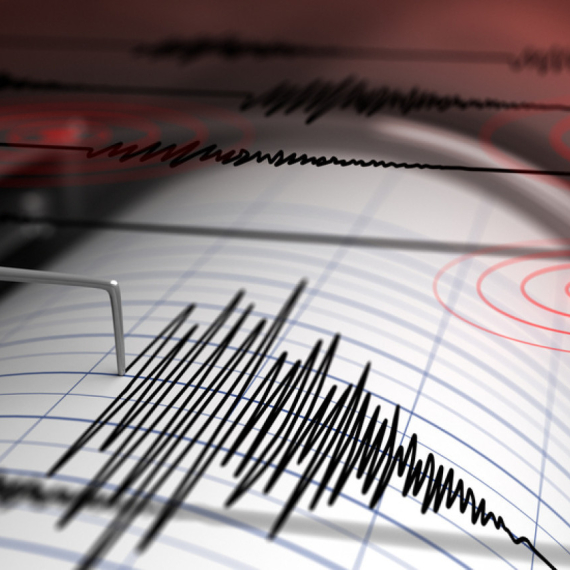Ministers explain, unions slam govt. move
Labor Minister Rasim Lajić says negotiations with representatives of war veterans from several southern municipalities will be continued on Thursday.
Monday, 25.01.2010.
11:42

Labor Minister Rasim Lajic says negotiations with representatives of war veterans from several southern municipalities will be continued on Thursday. But Lajic said that there are two reasons why there can be “no talk about additional payments” according to the so-called Toplica model – one used by the previous government to settle similar disputes relating to unpaid and additional war wages. Ministers explain, unions slam govt. move According to Lajic, those who wish to have additional payments will have to address a court, while the Toplica model “was a mistake which the current government has no intention of rectifying and buying peace within the community that way". "We do not have that kind of money, so we can only discuss the process to solve the problem, and that process will take a while," Lajic noted. He said that the government is aware of the difficult position of the veteran population, especially in certain municipalities in Serbia, adding that it is not trying to avoid helping them. Lajic feels that there are three reasons for the present increase in the number of strikes and protests: the difficult financial situation, an attempt to gain certain rights and to turn the discontent of some individuals into a political issue. Meanwhile, after the government announced it told Serbian police (MUP) to use force to disperse protesters – workers and veterans – Deputy Prime Minister and Interior Minister Ivica Dacic said in Nis that the police must ensure normal transportation, and that its use to clear international roads and railways will be the last resort in solving problems. Commenting on the Serbian government conclusion from Friday, Dacic noted that the government realized the extent of the economic damage from having a transport route blocked every few days. "Serbia is losing its credibility in Europe that way," Dacic remarked, asking all those who were on protest not to do it in places where the police would have to react. Dacic also called for all protesters not to clash with the police, because "the police is not to blame for their problems." Everyone has to get involved in solving problems, from local authorities to the state ones, Dacic explained. "Various groups within the government have been formed to solve these problems, because the use of force is only the last resort in unblocking a road or railway," Dacic said. He stated that the Nis-Sofia and Leskovac-Skopje railways were cleared peacefully on Saturday. "The police reaction in Leskovac was not such that it could be called an action, because it is well known that the police can solve situations like that very efficiently," Dacic said. In Belgrade, President of the United Branch Unions Branislav Canak told B92 that the government, with this decision, is not solving the problems of the workers but demonstrating force. He said that the decision will not decrease the number of protests in Serbia. “This is a return to the good old Milosevic methods – let’s disperse those that are asking for something with beatings, and we don’t care what they are asking for. The old scenario returns, and this will be building up regardless of whether you push someone off of one railroad, and then they go to another, and even if you chase them off all railroads the problems remain unsolved and they build up, until one day people will come out in such great numbers that there will not be enough batons to chase them all away. That already happened to Milosevic,” Canak warned. Asked whether the decision violates workers’ rights, Canak said that “in states with the rule of law, there’s no need to go to any road or highway. If there’s no rule of law, then you must do what the state is doing to you. You have to push back in the same manner.” Asked why the decision to forcefully clear blockades came precisely now, Canak said that it is “because it appears to the government that this is gaining becoming widespread. They know best how many unsolved problems there are and how many people were hurt by the unsolved problems. And then they sat down and counted on more and more people heading out to railroads and highways, resorting to these measures that lead, or they believe are leading to a solution for something we have been waiting on for many years. The government counted, and knows how many things have not been solved, it said – ‘alright, at least this many people will come out, then it is better to react in time to scare them into not coming out’.” However, Canak believes that this will not stop protests in Serbia. “If you close a bowl with steaming water on one end, it will come out in another place. This was demonstrated a long time ago. These problems should be solved,” he said. Also commenting on the government decision, opposition SNS Legal Council official Marko Djuric said that this party is condemning the idea to get MUP involved in breaking up protests. Djuric said that Prime Minister Mirko Cvetkovic was in fact “signing the SNS petition for new elections when he signed the decision”. These measures are for emergency situations, Djuric said, adding that the government will face the consequences of their decision. But Serbian Railway came out in support of the government’s decision. The company’s media center director Nenad Stanisavljevic said that the company has suffered “enormous losses” because of the recent blockades, because since railroads have been blocked by protests for a total of about 15 days since the middle of last year.
Ministers explain, unions slam govt. move
According to Lajić, those who wish to have additional payments will have to address a court, while the Toplica model “was a mistake which the current government has no intention of rectifying and buying peace within the community that way"."We do not have that kind of money, so we can only discuss the process to solve the problem, and that process will take a while," Lajić noted.
He said that the government is aware of the difficult position of the veteran population, especially in certain municipalities in Serbia, adding that it is not trying to avoid helping them.
Lajić feels that there are three reasons for the present increase in the number of strikes and protests: the difficult financial situation, an attempt to gain certain rights and to turn the discontent of some individuals into a political issue.
Meanwhile, after the government announced it told Serbian police (MUP) to use force to disperse protesters – workers and veterans – Deputy Prime Minister and Interior Minister Ivica Dačić said in Niš that the police must ensure normal transportation, and that its use to clear international roads and railways will be the last resort in solving problems.
Commenting on the Serbian government conclusion from Friday, Dačić noted that the government realized the extent of the economic damage from having a transport route blocked every few days.
"Serbia is losing its credibility in Europe that way," Dačić remarked, asking all those who were on protest not to do it in places where the police would have to react.
Dačić also called for all protesters not to clash with the police, because "the police is not to blame for their problems."
Everyone has to get involved in solving problems, from local authorities to the state ones, Dačić explained.
"Various groups within the government have been formed to solve these problems, because the use of force is only the last resort in unblocking a road or railway," Dačić said.
He stated that the Niš-Sofia and Leskovac-Skopje railways were cleared peacefully on Saturday.
"The police reaction in Leskovac was not such that it could be called an action, because it is well known that the police can solve situations like that very efficiently," Dačić said.
In Belgrade, President of the United Branch Unions Branislav Čanak told B92 that the government, with this decision, is not solving the problems of the workers but demonstrating force.
He said that the decision will not decrease the number of protests in Serbia.
“This is a return to the good old Milosevic methods – let’s disperse those that are asking for something with beatings, and we don’t care what they are asking for. The old scenario returns, and this will be building up regardless of whether you push someone off of one railroad, and then they go to another, and even if you chase them off all railroads the problems remain unsolved and they build up, until one day people will come out in such great numbers that there will not be enough batons to chase them all away. That already happened to Milošević,” Čanak warned.
Asked whether the decision violates workers’ rights, Čanak said that “in states with the rule of law, there’s no need to go to any road or highway. If there’s no rule of law, then you must do what the state is doing to you. You have to push back in the same manner.”
Asked why the decision to forcefully clear blockades came precisely now, Čanak said that it is “because it appears to the government that this is gaining becoming widespread. They know best how many unsolved problems there are and how many people were hurt by the unsolved problems. And then they sat down and counted on more and more people heading out to railroads and highways, resorting to these measures that lead, or they believe are leading to a solution for something we have been waiting on for many years. The government counted, and knows how many things have not been solved, it said – ‘alright, at least this many people will come out, then it is better to react in time to scare them into not coming out’.”
However, Čanak believes that this will not stop protests in Serbia.
“If you close a bowl with steaming water on one end, it will come out in another place. This was demonstrated a long time ago. These problems should be solved,” he said.
Also commenting on the government decision, opposition SNS Legal Council official Marko Đurić said that this party is condemning the idea to get MUP involved in breaking up protests.
Đurić said that Prime Minister Mirko Cvetković was in fact “signing the SNS petition for new elections when he signed the decision”.
These measures are for emergency situations, Đurić said, adding that the government will face the consequences of their decision.
But Serbian Railway came out in support of the government’s decision.
The company’s media center director Nenad Stanisavljević said that the company has suffered “enormous losses” because of the recent blockades, because since railroads have been blocked by protests for a total of about 15 days since the middle of last year.




































Komentari 1
Pogledaj komentare